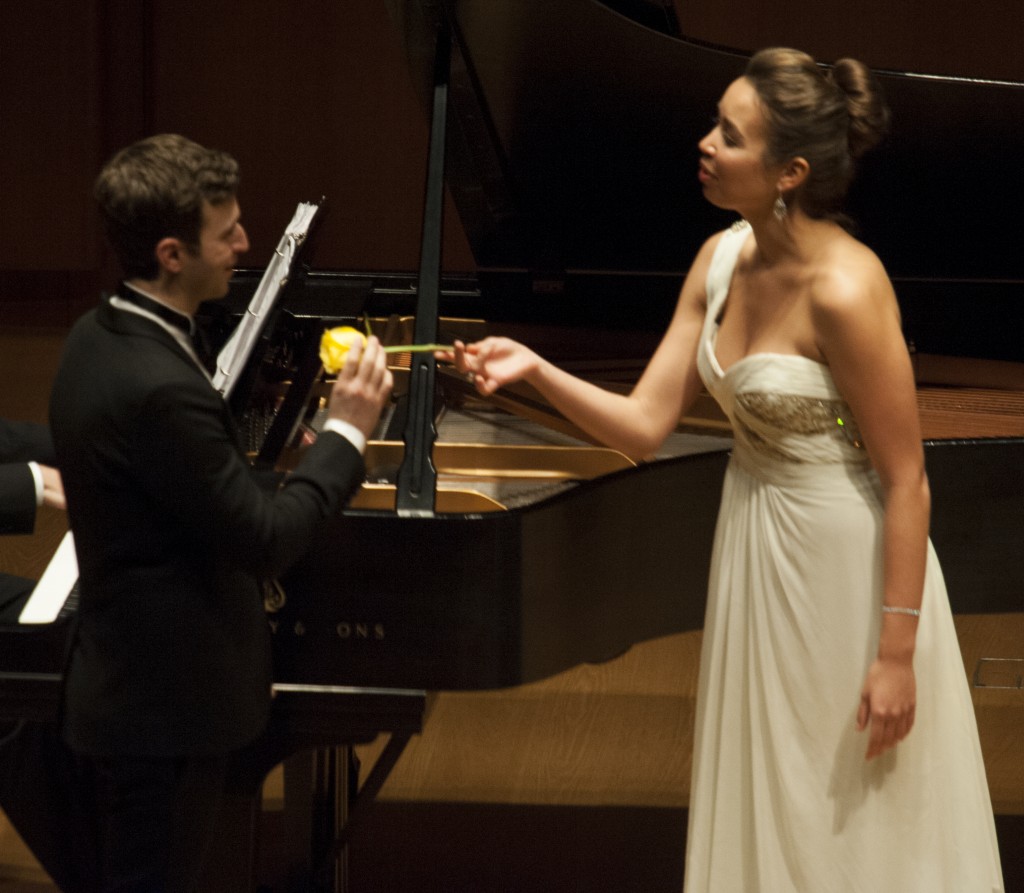Sierra and Costanzo wrap London series with mixed recital

Anthony Roth Costanzo and Nadine Sierra at their George London Foundation recital on Sunday. Photo: Shawn Ehlers
Winter may be showing signs of abatement in New York, but the season has gotten no less hazardous for singers. Soprano Nadine Sierra, taking the stage on Sunday with countertenor Anthony Roth Costanzo in the final George London recital of the season at the Morgan Library, was the latest in a string of singers to go boldly onstage battling a cold.
If she was affected, it was only slightly: her soft voice got a little breathy, especially up high, but her tone was smooth, with a calm vibrato. She has a warm, sunny tone that darkens very nicely, a variable quality that served her especially well in her first selection, Schubert’s two scenes from Lacrimas. Possessed of a natural, easy charisma, Sierra showed excellent textual awareness, mapping her phrases to the natural cadence of the text.
Working in a different idiom, Sierra sounded brighter and more assertive in Joaquín Turina’s three songs Homenaje a Lope Vega. She showed amazing precision in the steamy “Si con mis deseos,” carving out delicate turns as though with a scalpel before striking a declamatory note in “Al val de Fuente Ovejuna.”
Sierra showed yet another aspect in four of Ned Rorem’s Six Songs for High Voice. Her voice was at its most blinding in “Pippa’s song,” but was still spacious enough to conjure up images of daybreak. “Cradle song” and “In a gondola” showed Sierra’s only hints of harshness on this program, her high notes ever so slightly grabbed. The coquettish“Song for a girl” positively sparkled.
Like Sierra, Costanzo is an instantly likable figure onstage, and his emotional communication is powerful, as he demonstrated forcefully in “L’invitation au voyage,” one of three selections by Henri Duparc. It’s not so easy, though, to warm to his voice—there was often a pinched quality to Costanzo’s sound, and even when he opened up to sing at full volume it was cloudy. He could spin a gossamer pianissimo now and again, but often when he tried to sing softly, he had trouble keeping his tone steady.
It often felt like a struggle for Costanzo to get his voice to do what he wanted—his tone would spread, a high note wouldn’t register right away, or a pitch would stray slightly flat. In “Phidylé” he worked to weave a transfixing spell, but the effect was countered by the concern that a note might disappear at any moment.
His Liszt selections showed the same problems, as the passion of “In Liebeslust” felt constrained by the limits of his vocal apparatus. More successful was “Über allen Gipfein ist Ruh,” where he was able to sing clearly in a more placid vein, with no hint of straining. Bryan Wagorn had been a little clumsy in his accompaniment of Sierra’s Schubert, but his Liszt was darkly colorful, recalling shades of the B-minor sonata.
Costanzo was most at home in Handel’s “Rompo i lacci,” from Flavio, where he tossed off rapid scales with precision. More light came through in his voice here than had in his French and German selections. He did well, too, in his duets with Sierra, first the sighing “Io t’abraccio” from Rodelinda, and later in their two excerpts from Pergolesi’s Stabat Mater. Both singers sounded entirely comfortable in the oratorio style, though their harmony was less tight than it should have been.
Costanzo came to life in his encore, “Summertime.” One hardly imagines a countertenor’s voice for this song, but his was a moving rendition, bluesy and well relished. For the first time on this recital, there was not even the slightest sense that Costanzo was struggling against the music.
Sierra’s “O mio babbino caro” was, not surprisingly, splendid, its arches bending gracefully to the top, where she lingered forever with gorgeous tone. The last and most unlikely of their encores was also the most endearing—“Là ci darem la mano,” with Sierra as the suave Don Giovanni and Costanzo as a coquettish Zerlina. The duet was entirely whimsical, but it was beautifully sung, and the two were surprisingly credible in their parts.


